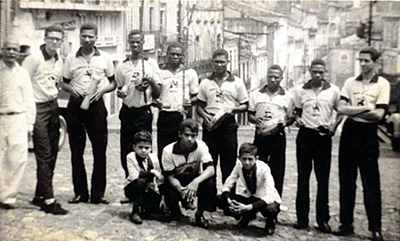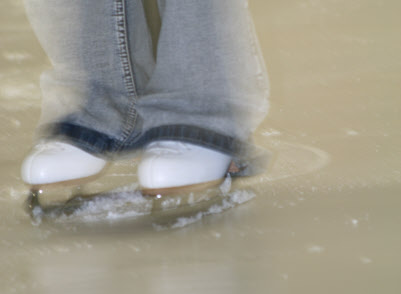Out of all the things in my life here – all the capoeira rodas, all the interesting conversations, all the great food, all the new experiences – the thing that I most wish my American family and friends were here to share with me is samba de roda.
Why? It’s hard to explain, because you have to be there to feel it. A good samba de roda among friends has such an incredible, special energy; it’s a lot of fun.
The bateria (orchestra) of samba de roda consists of the atabaque (drum), pandeiro (tambourine), agogô (two-toned bell), and caxixi (rattle), and the songs are call-and-response. The dance is fascinating: it’s a partner dance with one man and one woman in the center, but there’s little or no physical contact between the partners. Instead, they interact by dancing around each other, imitating each other, chasing each other, showing off, etc. If dances such as merengue and tango could be compared to seduction and sex, then samba de roda would be a flirtation: a more innocent, subtle, and complex interaction. Sounds weird, but that’s the best way I can think of to describe it.
Each person has a distinct way of dancing that makes their samba unique. Some make tiny, subtle gestures while others use wide and exaggerated movements. Some glide around the roda, barely lifting their feet from the ground, while others skip and hop. Turns, kicks, swivels, and other flourishes are added for embellishment. Women tend to take small, quick steps and use more hip movements; men tend to take wider steps and use more footwork.
In the process of cutting one of the dancers out, the key word is creativity. The guys often use kicks, trips, and headbutts from capoeira. Alternatively, they might offer the current dancer an instrument or a glass of beer to keep him occupied while the new dancer takes his place in the roda. The women usually bump each other out with their hips or bellies, or slink in between the couple in the roda as if they were “stealing” the man from the current female dancer.
Certain songs call for or suggest certain movements:
Segura morena, senão eu caio (Hold me, girl, or else I’ll fall)
Senão eu caio, senão eu caio (Or else I’ll fall, or else I’ll fall)
-> Often motivates the guy to careen around the roda, pretending to trip over his own feet (of course, still stepping perfectly on the beat!) while the girl runs to try to “catch” him.
A cachaça, ela te deixa muito besta (Rum makes you go crazy)
Ela desce na barriga (It descends to your stomach)
Depois sobe na cabeça (And then rises to your head)
-> The dancers move as though they were drunk
Quero ver descer, quero ver subir (I want to see you descend, I want to see you rise up)
Ponha a mão na cabecinha (Put your hands on your head)
Ponha a mão no ombrinho (Put your hands on your shoulders)
Ponha a mão na coxinha (Put your hands on your thighs)
…etc.
-> This one reminds me of Simon Says crossed with the Hokey Pokey
In addition, there are certain songs that call for specific solos or little games:
Pula por cima do pau, ô piabo (Jump over the stick, little fish)
Que a maré tá cheia! (Because it’s high tide!)
Pula, pula, pula, piabo (Jump, jump, jump, little fish)
Que a mare tá cheia! (Because it’s high tide!)
-> A long stick is placed on the ground, and the dancer has to make up a creative solo that involves jumping back and forth over it. If everyone in the roda knows each other, they’ll often sing the soloist’s name in place of “piabo.”
A Maria não é capaz (Maria is incapable)
De botar o pião no chão (Of putting the top on the ground)
A Shayna não é capaz (Shayna is incapable)
De botar o pião no chão (Of putting the top on the ground)
Lá vai, lá vai, lá vai (There it goes, there it goes, there it goes)
Lá vai o pião no chão (There goes the top on the ground)
-> During this song, whoever’s name is mentioned in the first line has to go into the center and dance. When the lá vai lines start, the person descends as low as they can, almost placing their rear end on the ground.
Nega do balaio grande (Girl with a big basket)
Ô balaio (Oh, basket)
Nega do balaio grande (Girl with a big basket)
Ô balaio (Oh, basket)
Êêêêêê, balaio (Heyyyyy, basket)
Êêêêêê, balaio (Heyyyyy, basket)
–pause–
Nega do balaio grande (Girl with a big basket)
Ô balaio (Oh, basket)
Nega do balaio grande (Girl with a big basket)
Ô balaio (Oh, basket)
-> During this song, the first lines are sung and played very slowly, and one woman dances to the relaxed rhythm, often pretending to hold and swing around a large basket. After the pause (all the instruments and singing cut off abruptly and simultaneously, and the dancer should stop as well), the music restarts at light-speed, and the woman has to dance her best fast samba to keep up!
Sai, sai, sai o morena (Leave, leave, leave, oh girl)
Saia da lagoa (Leave from the lagoon)
Ponha a mão na cabeça (Put one hand on your head)
Outra na cintura (The other on your waist)
Dá um remelexo do corpo (Give a swaying of your body)
Dá umbigada pra outra (Give an umbigada to someone else)
-> Calls for a woman to dance solo in the roda, performing the movements cited in the song, and then give an umbigada (bumping bellies) to another woman to take her place and do the same thing. This song usually gets repeated until every woman in the roda has soloed.
Then there are the songs that are just funny:
Marimbondo, marimbondo (Wasp, wasp)
Marimbondo me mordeu (The wasp stung me)
Me mordeu foi no umbigo (It stung me on my navel)
Mas se fosse mais por baixo (But if it was a little bit lower)
Meu caso tava perdido (All would be lost)
Menina tome cuidado (Girl, be careful)
Cuidado por não cair (Careful not to fall)
Se você escorregar (But if you do slip)
Caia em cima de mim (Please fall on top of me)
Amigo, meu colega (Friend, my comrade)
Se nós dois morasse junto (If we two lived together)
Cemetério na Bahia (The cemetery in Bahia)
Não cabia mais defunto (Wouldn’t be able to hold all the corpses)
Ô Inácio, ô Inácio (Oh Inácio, oh Inácio)
Mulher parida não come (A woman who has just given birth doesn’t eat)
Farinha no mesmo dia (Flour on the same day)
Se ela come ela morre (If she eats, she dies)
E os filhos não se criam (And no one raises the children)
Mulher danada é a Dona Maria (Mrs. Maria is a crazy woman)
Trabalha de noite, trabalha de dia (She works night and day)
Se não fosse o homem (If not for men)
A mulher não paria (Women wouldn’t give birth)
-> When a woman is leading this song, I’ve heard her sing the last lines: “se não fosse a mulher, o homen não vivia” (if not for women, men wouldn’t survive), or “se não fosse a mulher, o homem nem nascia” (if not for women, men wouldn’t even be born), etc.



